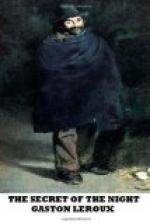“Now! exclaimed Matrena, whose tears, always ready in emotional moments, flowed freely. “But, Holy Mary, why do you speak to me without looking at me? What is it? What is it?”
“Don’t turn! Don’t make a movement! You hear — not a move! And speak low, very low. And don’t cry, for the love of God!”
“But you say at once ... the bouquet! Come to the general’s room!”
“Not a move. And continue listening to me without interrupting,” said he, still inclining his ear, and still without looking at her. “It is because these things were as the light of day to me that I say to myself, ’It is impossible that it should be impossible for a third person not to have placed the bomb in the bouquet. Someone is able to enter the general’s chamber even when the general is watching and all the doors are locked.”
“Oh, no. No one could possibly enter. I swear it to you.”
As she swore it a little too loudly, Rouletabille seized her arm so that she almost cried out, but she understood instantly that it was to keep her quiet.
“I tell you not to interrupt me, once for all.”
“But, then, tell me what you are looking at like that.”
“I am watching the corner where someone is going to enter the general’s chamber when everything is locked, madame. Do not move!”
Matrena, her teeth chattering, recalled that when she entered Rouletabille’s chamber she had found all the doors open that communicated with the chain of rooms: the young man’s chamber with hers, the dressing-room and the general’s chamber. She tried, under Rouletabille’s look, to keep calm, but in spite of all the reporter’s exhortations she could not hold her tongue.
“But which way? Where will they enter?”
“By the door.”
“Which door?”
“That of the chamber giving on the servants’ stair-way.”
“Why, how? The key! The bolt!”
“They have made a key.”
“But the bolt is drawn this side.”
“They will draw it back from the other side.”
“What! That is impossible.”
Rouletabille laid his two hands on Matrena’s strong shoulders and repeated, detaching each syllable, “They will draw it back from the other side.”
“It is impossible. I repeat it.”
“Madame, your Nihilists haven’t invented anything. It is a trick much in vogue with sneak thieves in hotels. All it needs is a little hole the size of a pin bored in the panel of the door above the bolt.”
“God!” quavered Matrena. “I don’t understand what you mean by your little hole. Explain to me, little domovoi.”
“Follow me carefully, then,” continued Rouletabille, his eyes all the time fixed elsewhere. “The person who wishes to enter sticks through the hole a brass wire that he has already given the necessary curve to and which is fitted on its end with a light point of steel curved inward. With such an instrument it is child’s play, if the hole has been made where it ought to be, to touch the bolt on the inside from the outside, pick the knob on it, withdraw it, and open the door if the bolt is like this one, a small door-bolt.”




